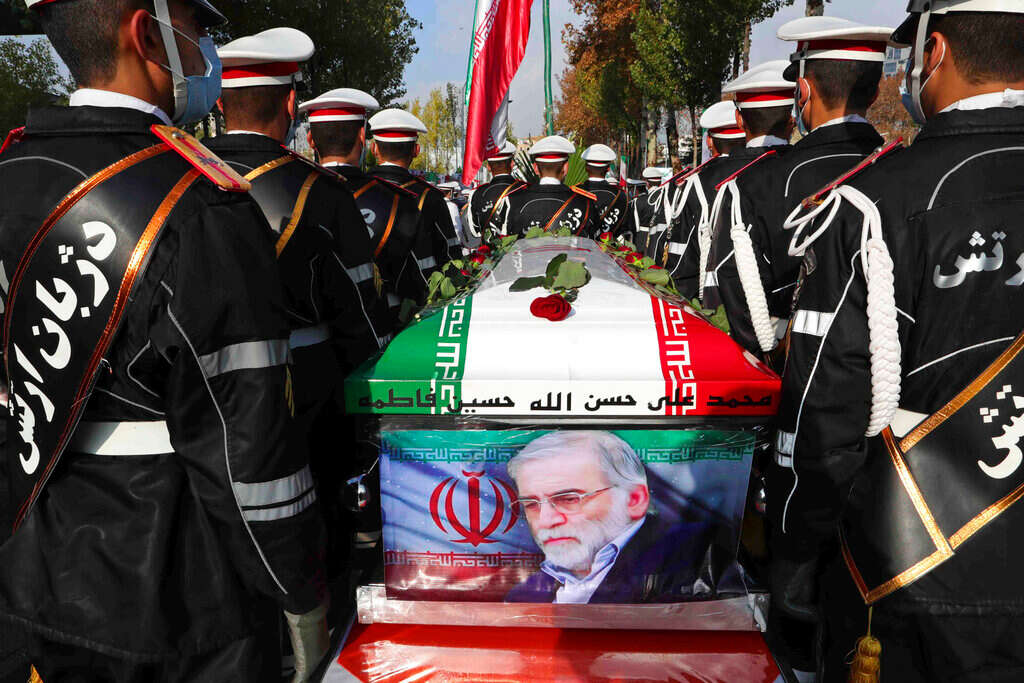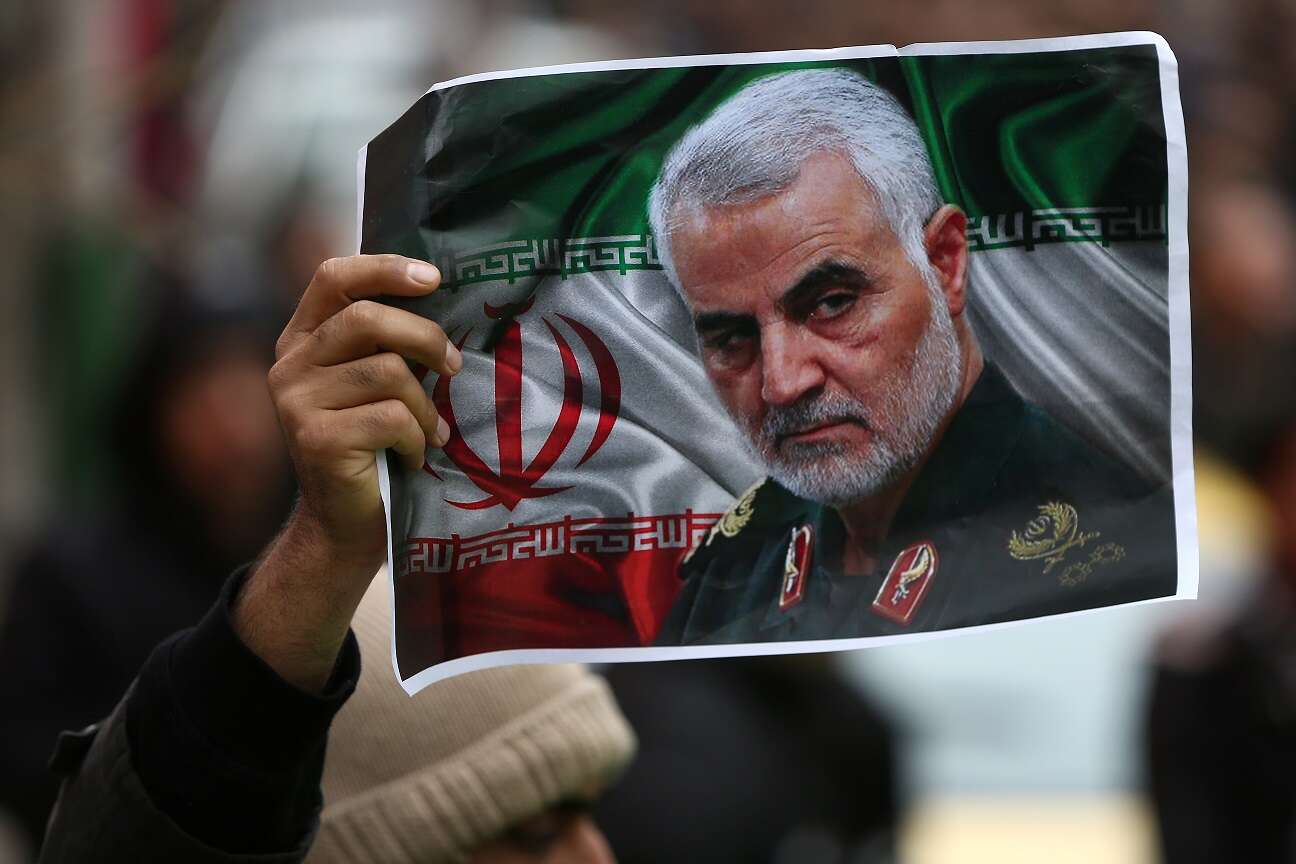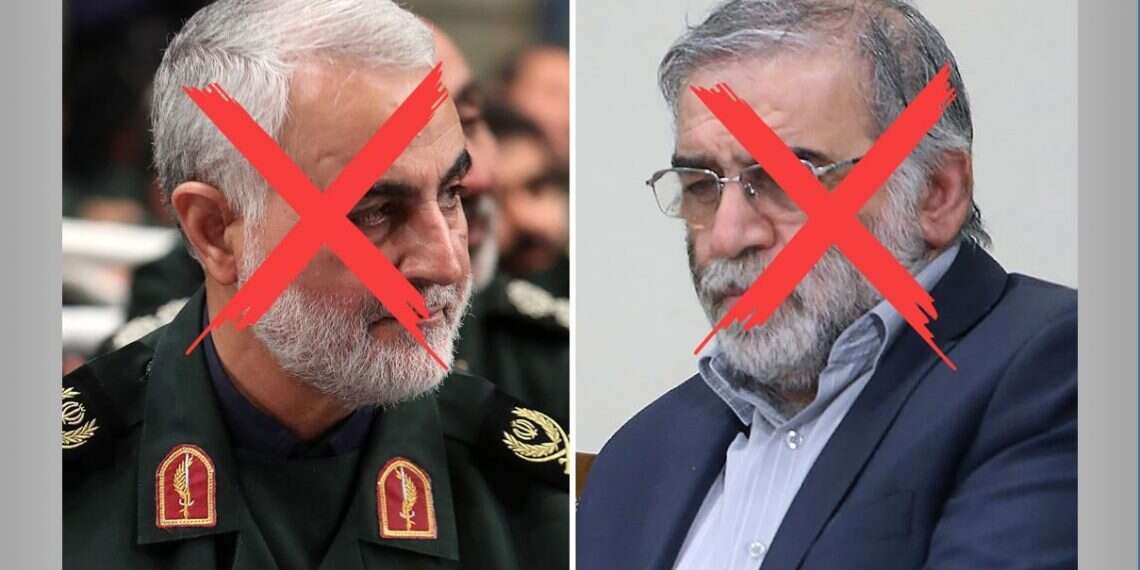by Lt. Col. (ret.) Michael Segall , JNS and ILH Staff
In Iran, the dilemma is growing with regard to how and where to respond to Mohsen Fakhrizadeh's assassination, and how far to stretch the regime's restraint.
Gen. Qasem Soleimani and nuclear scientist Mohsen Fakhrizadeh
Following the Nov. 27 assassination of Mohsen Fakhrizadeh, the head of Iran's military nuclear program, security officials in general and top Iranian Islamic Revolutionary Guard Corps officials, in particular, are increasingly critical and frustrated over the chronic weakness of the Iranian regime, government institutions and especially the intelligence agencies, which are supposed to safeguard senior officials and scientists and prevent "the infiltration of enemies into Iran's security system."
The criticism, mainly but not exclusively directed toward President Hassan Rouhani's government, is part of the local political campaigns ahead of Iran's June 2021 presidential elections. It is also a part of a broader debate ahead over the resumption of a dialogue with US President-elect Biden's administration, expected to enter the White House in January 2021. The Iranian response to Fakhrizadeh's assassination will affect relations with the Biden administration, especially given that Biden has already announced his readiness to negotiate a resumption of the 2015 nuclear deal with Iran.
Current and former IRGC officials and other conservative officials point to the exposure and large-scale penetration of the country by Israeli intelligence services, with the aid of local opposition figures. They estimate that Israel will continue with this policy, covertly, under the new US administration in the United States.

The normalization of relations between Israel and the United Arab Emirates and Bahrain, as well as the rapprochement with Saudi Arabia, the leader of the moderate Arab Sunni camp, intensifies fears among Iranian security and intelligence officials regarding Israeli intelligence activities in the region. They fear that Israel is expanding relations with countries around Iran, which would allow Israel a more convenient springboard for operational activity inside Iran and along its borders. After the resumption of relations between Israel and the UAE, many Iranian officials, including Rouhani, warned of this possibility and even directly threatened the leaders of the UAE and Bahrain.
This controlled response was carried out in anticipation of a change of administration in the United States. Additionally, it was apparently a result of operational weakness following Soleimani's assassination and the appointment of his successor, Esmail Ghaani. Iran has refrained from any high-profile activity against American targets in Iraq and in the region.
Iran's former Minister of Defense Hossein Dehghan, an adviser to Iran's Supreme Leader Ali Khamenei who also served as commander of the IRGC in Lebanon, said in an interview with Iranian state television on Nov. 28 that "infiltration" and "breaches of security" led to the assassination of Fakhrizadeh, and that those responsible for security "must be held accountable" for it.
On the one hand, Dehghan rejected criticism regarding the weak protection of Fakhrizadeh, but on the other he implicitly criticized the country's security services, saying that despite the regime's "intelligence expertise," a number of "security infiltrations" had taken place, including the 2017 Tehran terror attacks carried out by the Islamic State of Iraq and Levant (ISIL) against the Iranian Parliament (Majlis).
Hossein Alaei, a former IRGC commander, said that the assassination of Fakhrizadeh, who in addition to his scientific role held the rank of brigadier-general in the IRGC, was based on "accurate information" the enemies had obtained as a result of "weakness in the structure of Iranian security apparatuses." Israel's espionage infrastructure was still active within Iran, he said, adding, "This is the seventh assassination of Iranian nuclear scientists."
For more than 10 years, Israel has been conducting various operations inside Iran, including the elimination of scientists. The operation to assassinate the head of the Ministry of Defense Research and Innovation Organization indicates that Israel's operational infrastructure within Iran is well-equipped, very advanced and has access to accurate information. "So far, Israel has used all its intelligence, operational, security, cyber and diplomatic capabilities to counter Iran's nuclear program, and it is likely that this [Israeli] program is likely to continue," said Alaei.
Against this backdrop, Alaei emphasized that "regardless of Israel's intentions to carry out such assassinations, Iran must examine the weaknesses inherent in Iran's structure and security apparatuses, which enable the assassinations of esteemed victims like Fakhrizadeh despite an array of bodyguards for their protection."
Alaei, a candidate for the presidency after Rouhani, has repeatedly expressed support for dialogue with Americans and opposed radical regime conservatives. Regarding Fakhrizadeh's death, he added that "the recent assassination shows that Iran's operational and diplomatic responses so far to the assassinations of its scientists have not been a deterrent … Hopefully, the death of Dr. Fakhrizadeh will lead to a fatal blow to Israel's intelligence and operational infrastructure inside Iran."
Mohsen Rezaee, who commanded the IRGC during the eight-year Iran-Iraq war and who is currently a secretary of the regime's Expediency Discernment Council, also stated that the continued assassinations of senior Iranian scientists point to "the weakness of the country's intelligence organizations. The attacks must be curbed with double and double efforts."
Rezaee also addressed a letter to President Hassan Rouhani, pointing out that the president, who heads the National Security Council, should assign intelligence agencies the task of "identifying the main sources and infiltrators into the heart of Iran's intelligence agencies." He suggested that "civilian assistance and advanced technology" could be used for the investigation. He also warned that if such incidents continue, it would indicate a dangerous weakness of the Iranian intelligence systems.
"The Iranian people expect you [Rouhani], as the Chairman of the Supreme National Security Council, to prevent such terrorist acts and not to allow Iran's national security, which has been secured with the blood of thousands of precious victims, to be undermined."
The ultra-conservative newspaper Kayhan, reflecting the Iranian leader's opinion, quoted in its Nov. 29 headline Khamenei's remarks instructing the Iranian government to investigate the crime and severely punish its perpetrators and those who dispatched them. He further emphasized that "the martyr's scientific and technological efforts" should be continued.
Two days before, on Nov. 27, Kayhan stated, "The action of the Zionist regime in the elimination of our country's prominent scientist showed once again that this cancerous growth [Israel] continues all its efforts to halt Iran's scientific progress, and it does not fear any dirty action."
"What happened is one of the hundreds of terrorist acts carried out by the Zionist regime around the world over decades," Kayhan stated. "The Zionist regime receives intelligence and operational support from the United States and of some European countries. [They eliminated] politicians and scientists, cultural figures and military personnel, as well as anyone who is an obstacle to the progress of their domineering goals. The only thing that can halt this assassination machine is a timely and real ["tooth-shattering"] retaliation. The Zionists have proved time and again that they do not understand any other language rather than the language of power. The law of an eye for an eye will put these cowardly creatures in their place. The Zionists must wait for it."

(Reuters via West Asia News Agency)
Hossein Shariatmadari, Kayhan's editor-in-chief and Khamenei's representative, directed an editorial (Nov. 28) at Iran's leaders: "How can the Zionist regime, which is on the brink of decay today and surrounded by resistance forces on all sides, so easily murder our nuclear scientists?!"
He added, "Today, all the attention of the Iranian people and the Iranian regime must be focused on two targets: the first, the harsh retaliation against the criminal Zionists that will make them regret, and the second is identifying internal elements and possible infiltrators of the enemy into Iran's intelligence security systems."
Shariatmadari also called for "attacking the important port city of Haifa, destroying the strategic facilities, and causing heavy human casualties" to reach a "real deterrent point." Dr. Sadollah Zarei, an Iranian scholar and political analyst, wrote in Kayhan that Iran's reaction to suspected Israeli airstrikes that killed IRGC forces in Syria wasn't enough to deter Israel, while "striking Haifa … will definitely lead to deterrence because the United States and Israel are not ready to participate in a war and a military confrontation."
In Iran, the dilemma is growing with regard to how and where to respond to Fakhrizadeh's assassination, and how far to stretch the regime's restraint. So far, Iran has not responded as it is "required" to by the threats it issued following the deaths of Hezbollah international operations chief Imad Mughniyeh, Soleimani, operatives associated with Hezbollah's precision missile program, IRGC personnel in Syria, important figures among the pro-Iranian militias in Iraq, and others.
It is possible that Iran will continue its policy of restraint and choose to strike "easier" targets that are allied to the United States and Israel, such as the oil facilities and strategic infrastructure in Saudi Arabia. Such an attack took place on Sept. 19, 2019, with precision cruise missiles hitting the Saudi oil processing facilities in Abqaiq and Khurais.
In this regard, on Nov. 23, the Iranian Mehr news agency broadcast a video of an Aramco oil distribution site in Jeddah, Saudi Arabia, being hit by Quds-2 missiles launched by the Houthis in Yemen. Iran could be waiting for the new US administration, which might limit Israel's aggressive activities while negotiations are in the offing and test Israel-American relations, which reached new heights during Trump's presidency.
With the long-range missile attacks on Abqaiq and Khurais and periodic Houthi missile launches against strategic targets in Saudi Arabia, Iran demonstrated that it has the operational know-how to launch surprise attacks on strategic sites, including in Israel, with stealthy, precision cruise missiles.
One way or another, Iran must conduct a thorough house-cleaning in response to the repeated infiltrations and attacks on its security and intelligence establishments. These recurring intelligence operations have targeted Iran's scientists, nuclear infrastructure (such as the explosion in the Natanz enrichment facility in July 2020) and sometimes its electricity and oil facilities. As it has in the past, the regime will publicize over the next few weeks and in the run-up to presidential elections the arrests of people ostensibly involved in the attacks and espionage, so that it may salvage some of its honor among the Iranian people, who are exposed to details of the calamities via social media, international reports and the joyful Iranian opposition.
Reprinted from JNS.org.
Lt. Col. (ret.) Michael Segall , JNS and ILH Staff
IDF Lt. Col. (ret.) Michael (Mickey) Segall, an expert on strategic issues with a focus on Iran, terrorism, and the Middle East, is a senior analyst at the Jerusalem Center for Public Affairs and at Alcyon Risk Advisers.
Source: https://www.israelhayom.com/2020/12/07/plagued-by-intelligence-failures-iranian-security-apparatuses-aims-to-clean-house/
Follow Middle East and Terrorism on Twitter

No comments:
Post a Comment